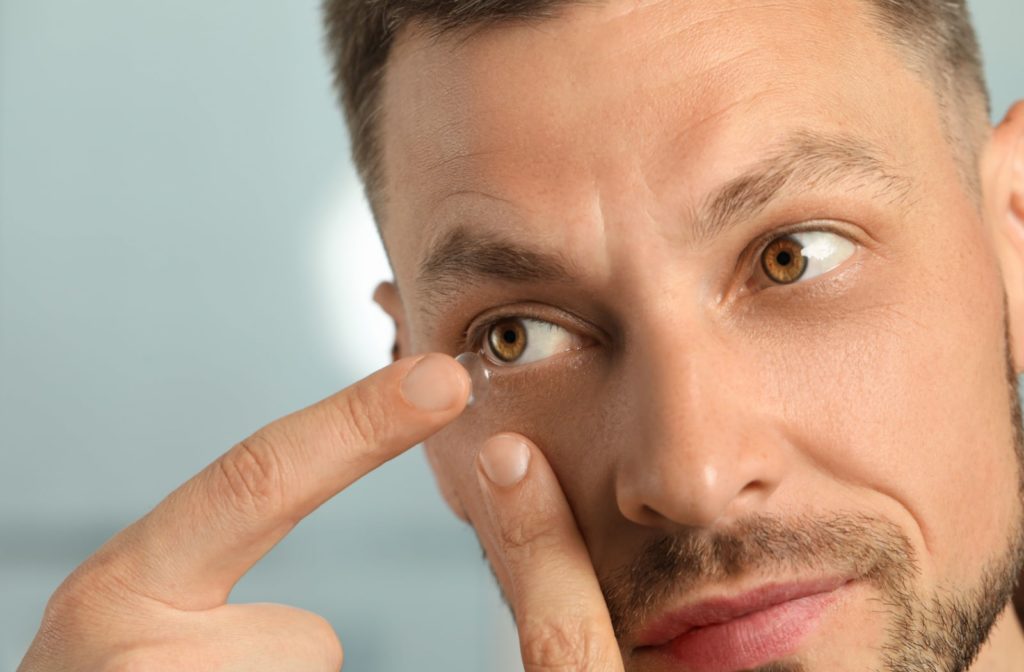Contact lenses offer convenience and freedom from traditional eyeglasses. They sit directly on the eye and provide unobstructed, natural vision. Different types of contacts include rigid gas-permeable, extended-wear, and daily, weekly, and monthly disposables.
Contact lenses have an average lifespan depending on their type: dailies are only strong enough to last one day. Weeklies last 1–2 weeks, and monthlies and extended-wear contacts can last a month with proper care.
If you have questions about your contact lenses, our team at 2020 Eyecare Ohio can help.
The Average Lifespan of Different Types of Contact Lenses
Manufacturers design lenses to withstand a certain wear period, but their durability may vary based on individual care routines. Proper handling, cleaning, and storage can help extend the lifespan of any lens. However, environmental conditions, eye tear production, and overall eye health can also affect how well lenses hold up over time.
Daily Disposable Lenses
Daily disposable lenses are designed for one-time use and are less durable than longer-wear lenses. Daily lenses should be discarded after each use to prevent infection and maintain optimal vision clarity.
Wearing dailies for longer than a single day can lead them to break down and cause discomfort and poor vision quality. Make sure to open and use a new pair of lenses daily to keep your eyes fresh and your vision sharp.
Biweekly Lenses
Biweekly contact lenses are designed to be worn daily for 1–2 weeks before being replaced. They are durable enough to last 2 weeks. Still, if you wear them beyond the recommended usage period, the lenses may accumulate protein deposits and debris, increasing the risk of eye infections and discomfort.
You’ll want to switch to a fresh pair of biweekly contacts every 2 weeks to help your eyes stay comfortable, and your vision remains clear.
Monthly Lenses
Monthly contact lenses, also known as monthly disposable contact lenses, are designed to be worn daily for 1–3 months before being discarded. Monthlies also need to be removed, cleaned, and stored correctly every day to help maintain eye health and comfort. This routine prevents the buildup of debris and protein deposits on the lens that can lead to blurry vision and discomfort.
You’ll want to swap out your monthly contacts for a fresh pair every 1–3 months. Wearing monthly contacts past the recommended time can harm your eye health. The longer you wear contact lenses beyond their prescribed duration, the higher the likelihood of accumulating protein deposits and debris on the lenses that can contribute to eye infections.
Extended Wear Lenses
Extended-wear lenses are designed for continuous wear, usually ranging from 1–6 nights or up to 30 days, depending on the specific type. These contacts are engineered to withstand the rigors of continuous wear, providing reliable vision correction for the designated duration.
The specific replacement schedule may vary based on the type of extended-wear contacts you have, so follow your eye doctor’s recommendation when you need a new pair of contacts.
Rigid Gas-Permeable Contact Lenses
Rigid gas-permeable contacts (RGP) are hard lenses made of silicone-containing compounds that allow oxygen to pass through, enabling your eyes to “breathe.” They are known for providing clear vision and are particularly effective for addressing specific vision issues such as presbyopia, astigmatism, and myopia.
RGP contacts are built to last and are generally more durable than soft contact lenses. With proper care and maintenance, an RGP lens can last at least a year or more before needing replacement. You should have regular checkups with your eye doctor every 6 months to ensure your RGP lenses are still in good condition.
Do Contact Lenses Expire?
Yes, like many medical devices, contact lenses have an expiration date, and using them past that can lead to complications.
Some signs of expired contact lenses include:
- Discomfort and irritation
- Diminished visual clarity
- Increased eye infections
If you notice any of the signs of expired contact lenses, you should contact your optometrist to order a new pair.
Tips for Caring for Your Contact Lenses
Taking care of your contact lenses is important to their longevity. Here are some ways to take care of your contact lenses:
- Always wash your hands thoroughly with a mild, non-irritating soap before handling your lenses.
- Use the recommended contact lens solution and avoid water exposure to keep your lenses in top condition.
- Keep to the prescribed replacement schedule for your specific type of lenses to maintain good eye health.
What Can Compromise the Lifespan of Contacts?
Proper care and handling are essential for keeping your contact lenses in good condition for as long as possible, but some factors can cause them to degrade faster:
- Improper cleaning and storage: If you don’t clean and store your lenses correctly, they can degrade faster.
- Exposure to water: Swimming or showering while wearing lenses and exposure to water during activities can lead to quicker degradation. Water can affect the quality of the lenses.
- Use of products while wearing lenses: Products like hairspray or lotion can impact your lenses, causing them to degrade faster. It’s best to apply these products before inserting your lenses.
- Environmental factors: Dust, smoke, and air pollution can degrade contact lenses.
Contact Lenses in Loveland, Ohio
Contact lenses are a viable alternative to glasses, though they require a commitment to proper care and safe handling. Every contact lens lasts a different amount of time, depending on its design and durability. It’s important not to wear contacts past the recommended duration or expiration date to avoid discomfort or potential eye health issues.
Your eye doctor can provide personalized advice tailored to your vision needs. Call us at 2020 Eyecare Ohio before changing your eye care routine, and book an appointment today. We’re here to help.



